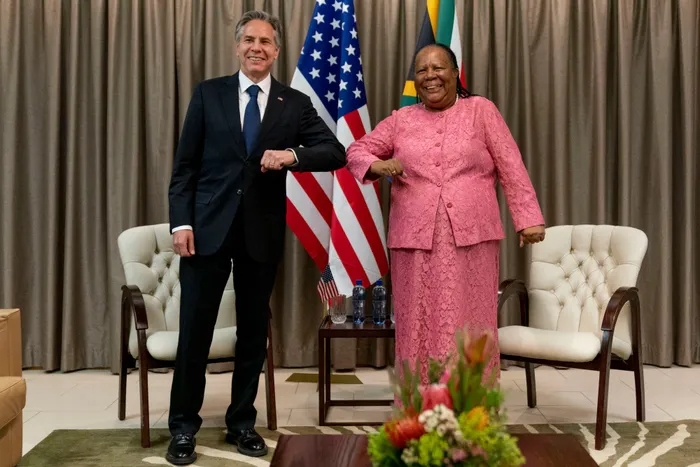The warrant of arrest for President Putin and its implications for South Africa

Picture: Andrew Harnik/POOL/AFP/Taken on August 8, 2022 – US Secretary of State Antony Blinken, left, is greeted by South Africa’s Foreign Minister Naledi Pandor as he arrives for a meeting at the South African Department of International Relations and Co-operation in Pretoria, South Africa. In the meeting, the Pandor accused the West of bullying and patronising African states, reiterating South Africa and the US’ different views on the Ukrainian war.
On March 17, 2023, the International Criminal Court (ICC) issued a warrant of arrest for Russia’s President Vladimir Putin for alleged war crimes of unlawful deportation and transfer of population (children) from occupied areas of Ukraine to the Russian Federation.
This follows a series of attempts by the international community to intervene through the United Nations (UN) in a bid to resolve the Russia-Ukraine conflict. The Resolution A/ES-11/7 passed on 23 February 2023, was the latest attempt by the UN to condemn Russia. The organisation stressed an “immediate, complete, and unconditional” Russian withdrawal from Ukraine.
Ukrainian President Volodymyr Zelensky welcomed the resolution calling it “a powerful testament to the solidarity of the world community with the Ukrainian people in the context of the anniversary of Russia’s full-scale aggression”. The resounding decision saw 141 countries condemning the Russian invasion, with seven against and 32 abstentions, including South Africa. To date, according to the UN High Commissioner for Human Rights (OHCHR), 8,400 civilians have been killed and over 22,000 injured in the conflict.
South Africa’s abstention did not come as a surprise given its previous neutral stance. On 3 March, 7 April and 12 October 2022, South Africa abstained from voting for the UN resolutions against Russia. On the continent, other countries that have adopted a similar stance include Algeria, Ethiopia, Uganda, and Zimbabwe. Interestingly, China and India which are part of the emerging economies of Brazil, Russia, India, China and South Africa (BRICS) also abstained. Clearly, these states are not prepared to risk their affiliation with Russia by voting against the Kremlin. Furthermore, they seek to challenge the global hegemony of the United States (US).
Pretoria has been vocal in its criticisms of the West, particularly the US’s position on the Russia-Ukraine crisis. In August 2022, South Africa’s Minister of International Relations Dr Naledi Pandor, hosted the US Secretary of State Antony Blinken in Pretoria. In the meeting, the Pandor accused the West of bullying and patronising African states, reiterating South Africa and the US’ different views on the Ukrainian war.
Furthermore, Pandor has raised concerns about the ICC’s double standards. She stated that “if you are powerful and enjoy an elevated status in the global community you escape, and this dims the objective status of the ICC”.
The leader of the opposition party the Economic Freedom Fighters, Julius Malema echoed Pandor’s statement calling the ICC “hypocrites”. He called out the ICC for not finding justice for the deaths of Saddam Hussein in the US-led intervention in Iraq and Muammar Gaddafi in a NATO-led intervention in Libya. Malema thus stated that Putin is welcome in South Africa and pledged that the Russian President will be fully protected. This is a reminder of Nelson Mandela’s iconic televised interview on the relationship between South Africa and Palestinian Yasser Arafat, Libyan Muammar Gaddafi, and Cuban President Fidel Castro in 1999. Mandela said the outside world makes the mistake of believing that its enemies should be our enemies.
The ICC arrest warrant for Putin raises questions for states like South Africa that have favourable relations with Moscow. Moreover, this creates a feeling of déjà vu as the ICC issued a similar warrant of arrest for former Sudanese President Omar al-Bashir in 2009 on charges of genocide and crimes against humanity. While Bashir was attending an African Union (AU) Summit in South Africa in 2015, a South African High Court ruled that the Sudanese President should not be allowed to leave the country in keeping with the country’s mandate as a signatory to the ICC.
However, Pretoria ensured Bashir’s safe return to Sudan. As a result, the ICC ruled that South Africa failed to fulfil its international obligations under the Rome Statute. This prompted South Africa to announce its intention to withdraw from the ICC in late 2016. However, this decision was later revoked following a High Court ruling that the move was “unconstitutional and invalid”.
South Africa is confronted with similar diplomatic dilemma as regards Putin’s arrest warrant. In August, Putin is expected to attend the BRICS summit which will be held in South Africa, a meeting that will once again draw global attention to South Africa in relations to its obligation to the Rome statute.
South Africa has been viewed as a moral compass for the rest of Africa in the eyes of US and its allies. It is, however, developments such as this that have undermined the country’s image in the West.
It is imperative for South Africa to craft a foreign policy that will not trigger animosity in both camps – US and Russia. The anticipated BRICS currency will have wider impact on the dominance of the US dollar in international political economy, reinforcing the BRICS states’ resolve to challenge the hegemony of the US. However, South Africa should consider to be non-aligned in critical international political situations such as the Russia-Ukraine crisis in order not to be caught up in the whirlwind of geopolitics.
Jabulani Sibande is Research Assistant, University of Johannesburg’s Institute for the Future of Knowledge, Johannesburg.